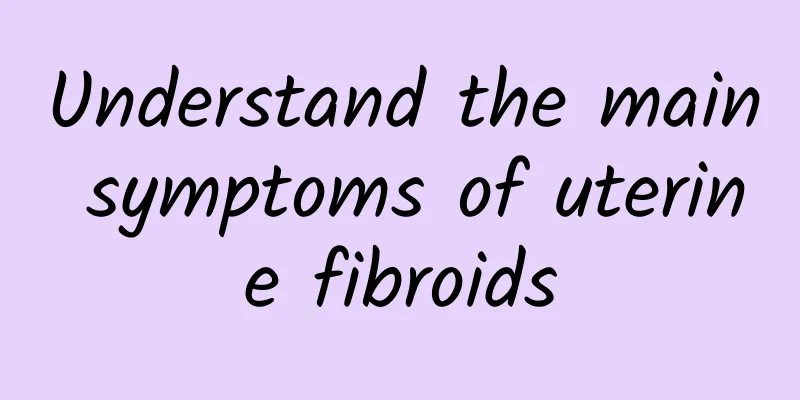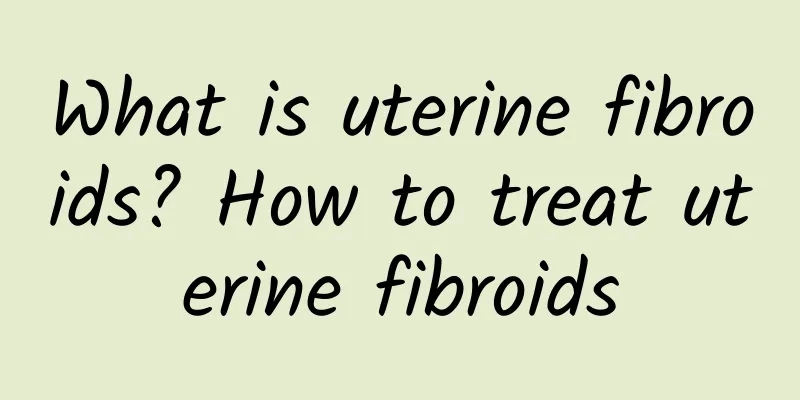Understand the main symptoms of uterine fibroids

|
Do you know what the symptoms of uterine fibroids are? What do the symptoms of uterine fibroids look like? When we don't know the symptoms of uterine fibroids, we often think that we are just experiencing common gynecological symptoms, but we don't know that a potential female killer is quietly approaching you... If you want to know more about the symptoms of uterine fibroids, please pay attention to the following introductions to the symptoms of uterine fibroids compiled by experts: 1. Increased leucorrhea: Increased leucorrhea, sometimes with a large amount of purulent and bloody discharge and slough-like tissue discharge with a foul odor. This is a common gynecological symptom and also an early manifestation of uterine fibroids. 2. Menstrual changes: The most common symptom of uterine fibroids, manifested as shortened menstrual cycle, increased menstrual flow, prolonged menstrual period, irregular vaginal bleeding, etc. 3. Pain: Generally, patients do not have abdominal pain, but often have lower abdominal distension, back pain, etc. 4. Abdominal mass: The abdomen is swollen, and a mass can be felt in the lower abdomen, accompanied by a feeling of falling. When the pedicle of the subserosal fibroid is twisted, acute abdominal pain may occur. When the fibroid turns red, the abdominal pain is severe and accompanied by fever. 5. Infertility: Fibroids compress the fallopian tubes, causing them to twist, or deform the uterine cavity, thus preventing the fertilized egg from implanting and leading to infertility. 6. Secondary anemia: If the patient has excessive menstruation for a long time, it may lead to secondary anemia, with symptoms such as general fatigue, pale complexion, shortness of breath, and palpitations. 7. Hypoglycemia: Hypoglycemia associated with uterine fibroids is also rare. The main symptoms are low fasting blood sugar, loss of consciousness and even shock. The symptoms can completely disappear after glucose injection. The symptoms of hypoglycemia will completely disappear after tumor resection. 8. Compression symptoms: When the fibroids grow forward or backward, they can compress the bladder, urethra or rectum, causing frequent urination, dysuria, urinary retention or constipation. When the fibroids grow to both sides, they form broad ligament fibroids, which can compress the ureter and cause hydroureteral or renal pelvis; if they compress the pelvic blood vessels and lymphatic vessels, they can cause lower limb edema, which is a symptom of uterine fibroids that only exists in the late stage. The symptoms of uterine fibroids are very obvious. When symptoms of uterine fibroids appear, you must consult the hospital in time to ensure that the uterine fibroids are cured in the early stage and will not cause greater consequences to us. If you still have doubts about the symptoms of uterine fibroids, please consult our online experts, who will answer your questions. I wish you health and beauty! Uterine fibroids http://www..com.cn/fuke/zgjl/ |
<<: Do you know what ovarian cysts are?
>>: What are the main groups of people who suffer from uterine fibroids?
Recommend
Why does vulvar leukoplakia itch at night
The itch of vulvar leukoplakia at night is mostly...
Six common causes of dysmenorrhea in women
The causes of dysmenorrhea in women are a matter ...
Can people with uterine fibroids eat yuba?
Can people with uterine fibroids eat yuba? 1. Pat...
Traditional Chinese medicine remedies for treating amenorrhea
Traditional Chinese medicine remedies for treatin...
What are the causes of acute cervicitis?
Acute cervicitis is relative to chronic cerviciti...
What is the cause of cervical hypertrophy and excessive secretion?
Cervical hypertrophy and excessive secretions may...
Experts introduce the symptoms of hyperplastic vulvar leukoplakia
Hyperplastic vulvar leukoplakia is a common gynec...
What should I do if I have irregular menstruation due to uterine fibroids?
What should I do if I have irregular menstruation...
What are the symptoms of Bartholinitis in women?
The Bartholin's glands are located below the ...
How to deal with pregnancy with intramural uterine fibroids
How to deal with pregnancy with intramural uterin...
How to delay menstruation? What are the methods to delay menstruation?
As we all know, women have their own menstrual pe...
What causes cervical erosion?
Cervical erosion refers to ectopia of the cervica...
Does dietary fiber help you lose weight? Dr. Matsutani helped the internet celebrity’s daughter lose 60 kilograms?
Recently, there was a report on the Internet that...
How to treat bacterial vaginosis effectively
How to treat bacterial vaginosis? The so-called b...
Get rid of pear obesity! Nutritionist's advice: Reduce swelling in 1 day
The petty bourgeoisie lady who sits in the office...









